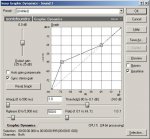nononsense!
New member
Do ANALOG hardware 'upward compressors' exist?
I have tried some plug-in demo's and it works so unconvenient being used to a simple analog compressor. Have tried the Neodynium plug which is very complicated and no preset called upward compressor.
Are there any analog hardware compressors doing upward compression?
I do not mean parallel compression which is very similar but less easier because you have to make an extra compressed channel next to the original. And the compressed signal leaks some compressed transients.
Look to the photo for what is meant by upward compressor.

I have tried some plug-in demo's and it works so unconvenient being used to a simple analog compressor. Have tried the Neodynium plug which is very complicated and no preset called upward compressor.
Are there any analog hardware compressors doing upward compression?
I do not mean parallel compression which is very similar but less easier because you have to make an extra compressed channel next to the original. And the compressed signal leaks some compressed transients.
Look to the photo for what is meant by upward compressor.

Last edited:



 does what compressors don't, and that is fix on broader strokes -not micro inter-phrase wave shaping.
does what compressors don't, and that is fix on broader strokes -not micro inter-phrase wave shaping. 